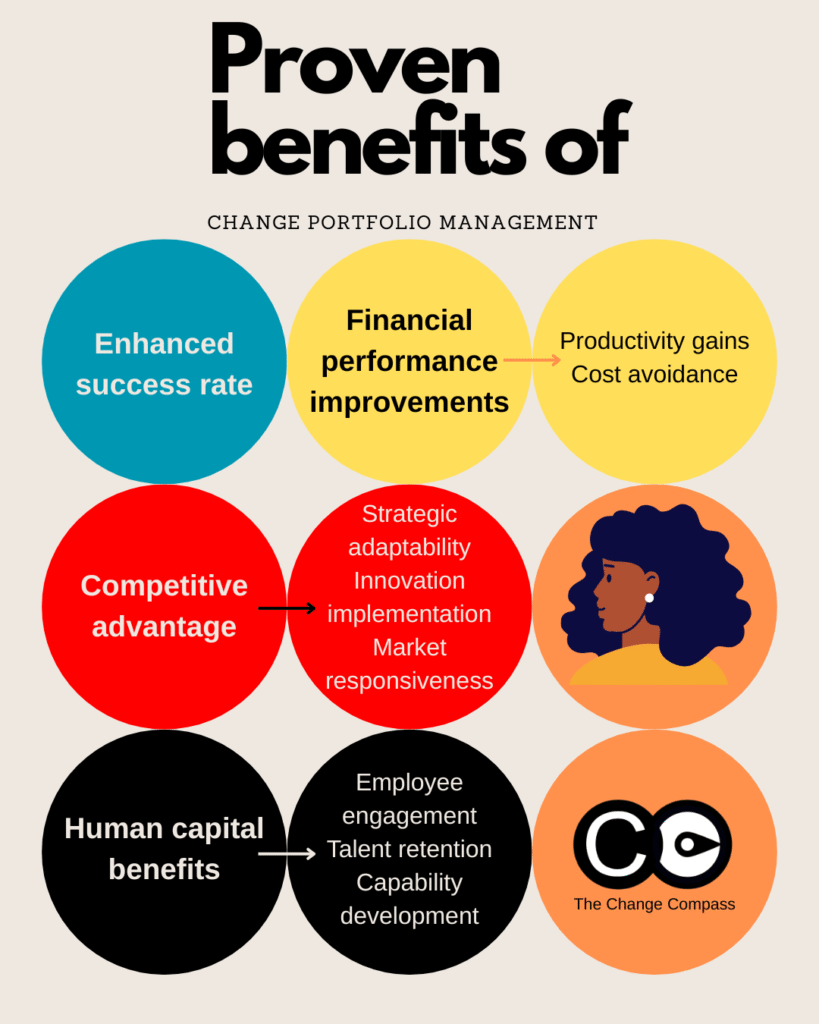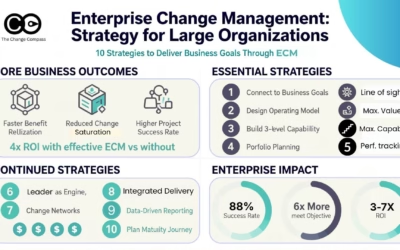Managing multiple changes is not a new phenomenon for a lot of organisations. However, the value of managing change at a portfolio level is not clear for a lot of leaders. This is a review of academic research on the value of managing multiple change initiatives across an organisation (change portfolio management), with specific focus on the impact of change on people and tangible business benefits. Drawing from peer-reviewed academic sources, this report identifies quantifiable business benefits and performance outcomes associated with effective change portfolio management.
Academic research consistently demonstrates that organisations face significant challenges when implementing multiple change initiatives simultaneously. However, organisations that develop effective change portfolio management capabilities achieve substantially better outcomes, including:
1. Productivity Improvements: Firms with more complex organisational capabilities show “considerably increased firm performance in terms of labour productivity” (Costa et al., 2023).
2. Competitive Advantage: Organisations with better change management capabilities gain strategic advantages over competitors with lower change capacity (Heckmann et al., 2016).
3. Organisational Resilience: Organisations with higher change capacity demonstrate greater resilience during periods of disruption (Mladenova, 2022).
This report synthesizes academic research to provide evidence-based insights on the tangible business benefits of effective change portfolio management.
Background
Organisations today face unprecedented pressure to implement multiple simultaneous changes. Technological disruption, competitive pressures, and evolving customer expectations drive the need for continuous transformation. However, academic research reveals that implementing multiple change initiatives simultaneously creates significant challenges for both individuals and organisations.
Here lies the dilemma. Most organisations are implementing multiple change initiatives. However, nearly all methodologies and change management concepts are only focused on one singular initiative been executed at a time.
Here we examine peer-reviewed academic research on how change portfolio management affects organisational outcomes and quantifies the tangible business benefits of effective change management. It focuses specifically on the value of effectively managing multiple change initiatives across the organisation and identifies measurable business benefits supported by scholarly evidence.
Journals reviewed
This review synthesizes findings from peer-reviewed academic journals including:
– Journal of Business Research
– SAGE Journals
– Industrial and Corporate Change (Oxford Academic)
– Cogent Business & Management
– Administrative Sciences
– Organisational Dynamics
The research focuses on empirical studies that quantify the relationship between change management approaches and business outcomes. Particular attention was given to studies that provide statistical evidence of the impact of change portfolio management on organisational performance.
Change Capacity Limitations: Academic Evidence
The Challenge of Multiple Change Initiatives
Academic research consistently demonstrates that organisations struggle to implement multiple change initiatives simultaneously. Mladenova (2022) found that “multiple and overlapping change initiatives become the norm rather than an exception, thus exert additional pressure on organisations.” Her research identified that when organisations face “increasing levels of unpredictability and need to adapt to fast environmental shifts, linear causal models to plan and implement changes become harder to follow.” However, the bulk of popular change management concepts are linear in nature.
Organisational Capacity for Change
Heckmann et al. (2016) define Organisational Capacity for Change (OCC) as “the capacity of an organisation to institutionalize and manage change on an ongoing basis.” Their empirical research found that “an organisation’s capacity for change associates positively with the performance of its change projects.”
Importantly, the study found that “higher levels of technological turbulence weaken” the relationship between organisational capacity for change and project performance. This suggests that organisations face even greater challenges managing multiple changes during periods of technological disruption.
Adna and Sukoco (2020) studied 313 middle managers and their followers and found that “organisational capacity for change mediates the influence of managerial cognitive capabilities on organisational performance.” Their research demonstrated that organisations need coordinated portfolio approaches to effectively manage multiple changes. Having the right routines also support continuous and multiple changes.

Tangible Business Benefits: Academic Evidence
Success Rate
Academic research provides clear evidence that effective change portfolio management significantly improves success rates:
– Improved Project Performance: Heckmann et al. (2016) found that “an organisation’s capacity for change associates positively with the performance of its change projects” in their empirical study of 134 German firms.
Financial Performance Improvements
Academic research demonstrates measurable financial benefits from effective change portfolio management:
– Productivity Gains: Costa et al. (2023) empirically demonstrated that firms with more complex organisational capabilities showed “considerably increases firm performance in terms of labor productivity.” Their study of Italian firms identified that “Complex” organisations (those with highest organisational capabilities) demonstrated superior productivity metrics compared to firms with less developed capabilities.
– Cost Avoidance: Errida and Lotfi (2021) systematic review of literature identified that failed change initiatives result in both direct costs (resources invested) and indirect costs (lost productivity).
– Resource Utilization Efficiency: Rousseau and ten Have (2022) found that organisations using evidence-based change management practices showed improved change-related decision quality, leading to better use of resources during change implementation.
Competitive Advantage
Academic research identifies clear competitive advantages from effective change portfolio management:
– Strategic Adaptability: Heckmann et al. (2016) established that organisations with better change management capabilities gain strategic advantages over competitors with lower change capacity. Their research demonstrated that organisations with higher change capacity are better positioned to implement future strategic changes.
– Innovation Implementation: Costa et al. (2023) demonstrated that firms with more complex organisational capabilities showed greater ability to innovate and adapt to market changes. Their research found that “higher organisational complexity—captured by the range and variety of actions put in place by firms—is thus reflected in better performance.”
– Market Responsiveness: Mladenova (2022) found that organisations with higher change capacity can better handle “multiple and overlapping change initiatives” which have “become the norm rather than an exception.” The research identified that organisations with higher change capacity demonstrate superior market responsiveness.
Human Capital Benefits
Academic research shows significant human capital benefits from effective change portfolio management:
– Employee Engagement: Mladenova (2022) found that organisations implementing multiple simultaneous changes without adequate change capacity experience diminishing returns partly due to employee disengagement. Organisations with effective change portfolio management maintain higher levels of employee engagement during periods of change.
– Talent Retention: Heckmann et al. (2016) found that organisations with higher change capacity experience lower turnover during periods of change. Their research demonstrated that effective change portfolio management contributes to organisational stability and talent retention.
– Capability Development: Costa et al. (2023) found that organisations with more complex capabilities develop stronger human capital over time. Their research demonstrated that investment in organisational capabilities creates a foundation for future performance improvements.
Organisational Performance Taxonomy
Costa et al. (2023) identified four clusters of firms based on organisational capabilities, providing a framework for understanding the relationship between change capabilities and performance. The following descriptions are inferred from the study and not actual quoted descriptions.
1. Essential (basic capabilities): Organisations with minimal change management capabilities that struggle with implementing multiple changes.
2. Managerial (moderate capabilities): Organisations with some change management capabilities but limited coordination across initiatives.
3. Interdependent (advanced capabilities): Organisations with developed change management capabilities and coordination across initiatives.
4. Complex (highest capabilities): Organisations with capabilities that can effectively implement multiple and complex changes. These tend to have experienced a range of ‘technological-organisational’ changes.
Their research demonstrated that firms in the Complex and Interdependent clusters showed significantly higher performance metrics than those in the Essential and Managerial clusters. This provides a framework for measuring organisational capability development and its impact on performance.
Recommendations from Academic Research
Academic research suggests several evidence-based approaches to improve change portfolio management:
1. Invest in Change Capacity: Heckmann et al. (2016) recommend that “companies should invest in their capacities for change, particularly in the HRM area” to build change capacity. Their research demonstrated that investment in change capacity is a strategic business decision with measurable returns.
2. Develop Integrated Approaches: Errida and Lotfi (2021) found that “the use of a single model or few models is not sufficient to cover various change situations” and that “integrating existing models may lead to an integrated understanding of how to ensure successful organisational change.”
3. Build on Positive Experiences: Heckmann et al. (2016) found that “positive experiences in previous change projects increase OCC (Organisational Capacity for Change).” Their research demonstrated that successful change experiences create a virtuous cycle that builds change capacity over time.
4. Use Evidence-Based Practices: Rousseau and ten Have (2022) found that “planned change is more likely to succeed when using science-informed practices” and that “regular use of four sources of evidence (scientific, organisational, stakeholder, and practitioner experience) improve the quality of change-related decisions.”
Academic Evidence for Change Portfolio Management
The academic research reviewed in this report provides clear evidence that managing multiple change initiatives as a portfolio delivers significant business benefits compared to uncoordinated change approaches.
Organisations that effectively manage their change portfolio can expect:
1. Improved Financial Performance: Better productivity, cost avoidance, and resource utilization.
2. Competitive Advantages: Enhanced strategic adaptability, innovation implementation, and market responsiveness.
3. Human Capital Benefits: Improved employee engagement, talent retention, and capability development.
4. Long-term Performance: Greater organisational resilience and sustainable growth.
Whilst there is not a lot of research currently in the newly emerging field of change portfolio management, overall academic evidence strongly supports the value of change portfolio management practices as a strategic approach to organisational transformation.
References
Adna, B. E., & Sukoco, B. M. (2020). Managerial cognitive capabilities, organisational capacity for change, and performance: The moderating effect of social capital. Cogent Business & Management, 7(1). https://doi.org/10.1080/23311975.2020.1843310
Costa, S., De Santis, S., Dosi, G., Monducci, R., Sbardella, A., & Virgillito, M. E. (2023). From organisational capabilities to corporate performances: at the roots of productivity slowdown. Industrial and Corporate Change, 32(6), 1217-1244. https://doi.org/10.1093/icc/dtad030
Errida, A., & Lotfi, B. (2021). The determinants of organisational change management success: Literature review and case study. SAGE Journals. https://doi.org/10.1177/18479790211016273
Heckmann, N., Steger, T., & Dowling, M. (2016). Organisational capacity for change, change experience, and change project performance. Journal of Business Research, 69(2), 777-784. https://doi.org/10.1016/j.jbusres.2015.07.012
Mladenova, I. (2022). Relation between Organisational Capacity for Change and Readiness for Change. Administrative Sciences, 12(4), 135. https://doi.org/10.3390/admsci12040135
Rousseau, D. M., & ten Have, S. (2022). Evidence-based change management. Organisational Dynamics, 51(3). https://doi.org/10.1016/j.orgdyn.2022.100899






